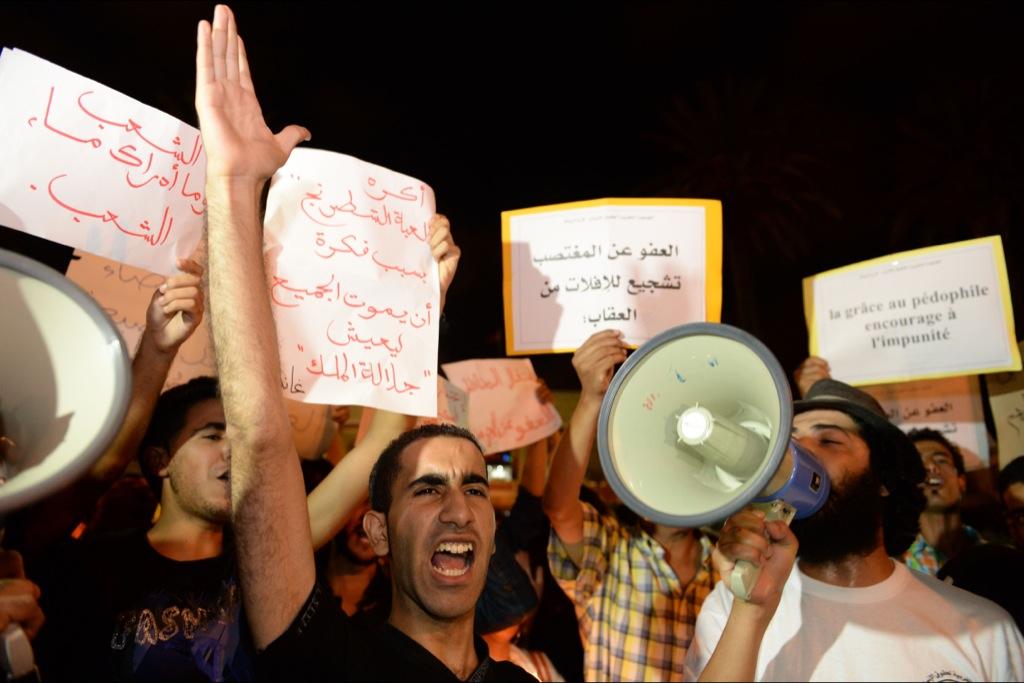Moroccan king responds to outcry over pardon of Spanish pedophile
Protesters chant slogans during a demonstration on Aug. 7, 2013 in Rabat against Morocco’s King Mohamed VI’s pardon of a Spanish pedophile. The king later reversed the decision.
ALEXANDRIA, Virginia — Throne Day is Morocco’s most important non-religious holiday. Every year on July 30, Moroccans celebrate the bonds that link them to the 600-year monarchy, renew their vows of allegiance to the king, and gather for festivities and ceremonies from Tangiers in the North to Laayoune in the South.
On Throne Day, the king gives his state of the kingdom speech, makes major policy announcements, and hosts a royal reception for palace officials, government ministers, the nation’s representatives, foreign diplomats, and international dignitaries.
Throne Day is also an occasion for the monarch, as head of state, to issue royal pardons. This year King Mohammed VI pardoned 1,044 prisoners, including 48 Spaniards. On the list of the pardoned was Daniel Galvan Fino, 63, a Spanish pedophile convicted of raping 11 children between the ages of four and 13. Galvan had served three years of a 30-year sentence for his heinous crimes.
Within hours of the pardon list's publication, social media lit up with messages of indignation, outrage and anger. On Facebook, Twitter and in the booming Moroccan electronic press, news spread fast, and angry families with their children in tow took to the streets in protest.
By Friday night, Aug. 2, the protest had spread to most major Moroccan cities, an unprecedented event in the kingdom; Moroccans of all social backgrounds were for the first time publicly and openly protesting a decision made by their king.
King Mohammed VI, who has occupied the throne since 1999, is a reform-minded monarch whose legitimacy in Morocco is uncontested. His popularity in the Middle East is unrivaled and his achievements as a leader are simply undeniable.
More than a decade ago, King Mohammed VI established a Truth and Reconciliation Commission to investigate serious human rights violations committed under his father’s rule. He also reformed the country’s personal status laws to grant Moroccan women full legal equality under the law, launched massive infrastructure projects and transformed Morocco into a major destination for foreign investment.
In 2011, when the Arab Spring was in full sway, King Mohammed VI took historic steps to cement the country‘s transformation. An independent commission drafted a new constitution, which was ratified by referendum; fair and free elections followed. Today a moderate Islamist party heads the country‘s government, and many of the king’s own powers have been curtailed.
The king displayed the same decisive responsiveness that served him well during the Arab Spring when he dealt with strong public opposition to the Galvin pardon this month.
On Aug. 3, the royal palace issued an explanatory statement asserting that the king never knew about Daniel Galvan's unspeakable crimes, and that the pardon was indeed an error.
The next day the king revoked the pardon, an act that opened the way for the Spanish authorities to rearrest Galvan. On Aug. 5, the King fired the country’s High Commissioner for Prisons, and on Aug. 6, he received the families of the victims to express empathy and pledge support.
The Moroccan people’s love for their king is deep. But last week, their love collided with fear. They worried about the safety of their children, and they trembled for the reputation of their country as a haven for sexual deviants and pedophiles.
According to Ne Touche Pas a Mon Enfant (Do Not Touch My Child), a local non-profit working in child protection, more than 26,000 children are sexually abused in Morocco every year, mostly at the hands of foreigners.
In conservative Morocco, where tourism is a major economic activity, sex crimes by tourists are dealt with quietly and often at the expense of the victim. In fact, what made Galvan’s case notorious even before the pardon is the lengthy sentence he received for his vicious crimes; his thirty years was the harshest sentence of its kind in the legal history of Morocco.
If there’s a silver lining to the Galvan fiasco, it is that the Moroccan people finally and spontaneously decided to break the walls of silence that for years surrounded sex crimes, a silence that often punished the victim and protected the abuser.
The king’s courageous decision to publicly and immediately revoke the pardon is a strong and hopeful signal that the time of impunity for sex crimes in Morocco is over.
Ali O. Amar is an international development consultant specializing in the Middle East and North Africa. He previously served as vice president of New Dominion Political Action Committee (NDPAC), which gives a voice to the American-Arab community of Virginia. His current work focuses on strengthening the rule of law, transitional reform and political risk management. He was based in Morocco from 2009 to 2013. Contact him at onecasea@gmail.com.
Every day, reporters and producers at The World are hard at work bringing you human-centered news from across the globe. But we can’t do it without you. We need your support to ensure we can continue this work for another year.
Make a gift today, and you’ll help us unlock a matching gift of $67,000!
